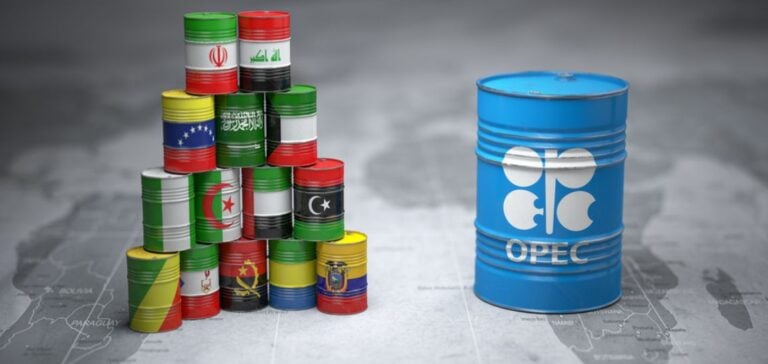Members of the Organization of the Petroleum Exporting Countries (OPEC) and their allies, known as OPEC+, have decided to extend for one month the existing oil production cuts. Eight countries, including Saudi Arabia, Russia, Iraq, the United Arab Emirates, Kuwait, Kazakhstan, Algeria, and Oman, announced this decision on November 3. This group has decided to maintain a total reduction of 2.2 million barrels per day, a measure initially planned to last until the end of November.
The reasons for this extension are tied to current crude oil prices, with American WTI and European Brent crude hovering around $70 per barrel. This level is seen as unsatisfactory for these oil-producing countries, amid a context of uncertain global demand and an accelerating supply. The decision by these eight members thus aims to curb supply to stabilize prices and better regulate the fluctuations of the energy market.
OPEC+ Strategy Amid Global Economic Uncertainties
This extension of cuts comes as the oil market faces pressure from several economic factors. China, representing the second-largest oil consumption market, is experiencing an economic slowdown, raising concerns among energy producers. Meanwhile, the United States is focused on its presidential election in November, the results of which could influence future energy and trade policies.
OPEC+ formed a strategic alliance in 2016 to control fluctuations in the global oil market. Through various regulatory mechanisms, OPEC+ has kept a significant portion of its resources underground, totaling nearly six million barrels per day. These cuts are structured to respond both to the alliance’s needs and the voluntary reductions decided by member states. The goal is to prevent excessive price declines that would weaken the economy of member countries, which rely heavily on oil revenues.
A Possible Revision Starting in Early 2025
Although this extension is limited to one month, ministers of OPEC+ member countries plan to meet again in December at the organization’s headquarters in Vienna to assess the situation. However, with this early announcement, OPEC+ suggests that production levels could be resumed later, starting in early 2025, if economic conditions improve. At their last meeting in June, members had considered resuming production levels in October. However, they took care to retain the possibility of adjusting this decision based on market developments.
By postponing this increase, OPEC+ demonstrates its strategic flexibility, responding to economic pressures while safeguarding the interests of its members. This adaptability allows the alliance to remain influential in the global energy market despite growing competition from other oil producers and alternative energy sources.
A Global Energy Context in Transition
OPEC+’s actions take place within a context where the energy sector is undergoing significant change, facing the rise of renewable energies and alternative fuels. Nevertheless, for countries dependent on oil revenues, price stabilization remains a priority to ensure the sustainability of their economies. The decision by the eight member countries to maintain their production cuts can be seen as an attempt to influence the dynamics of an energy market in transition.
By upholding this control strategy, OPEC+ underscores that oil remains a central resource for the global economy, despite uncertainties and challenges related to evolving climate policies and global economic trends.





















